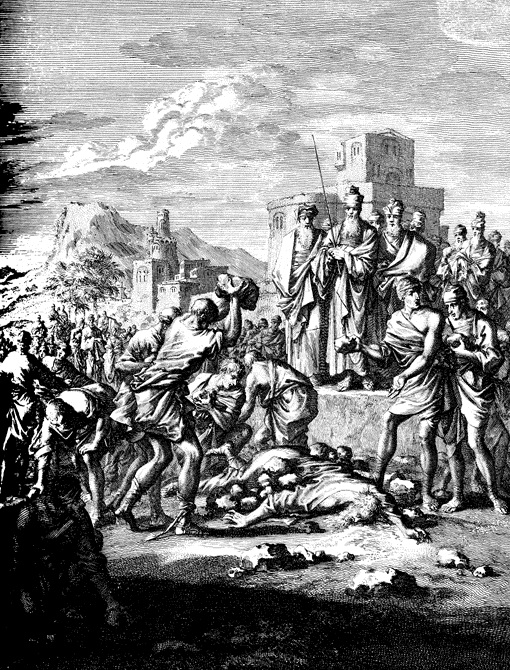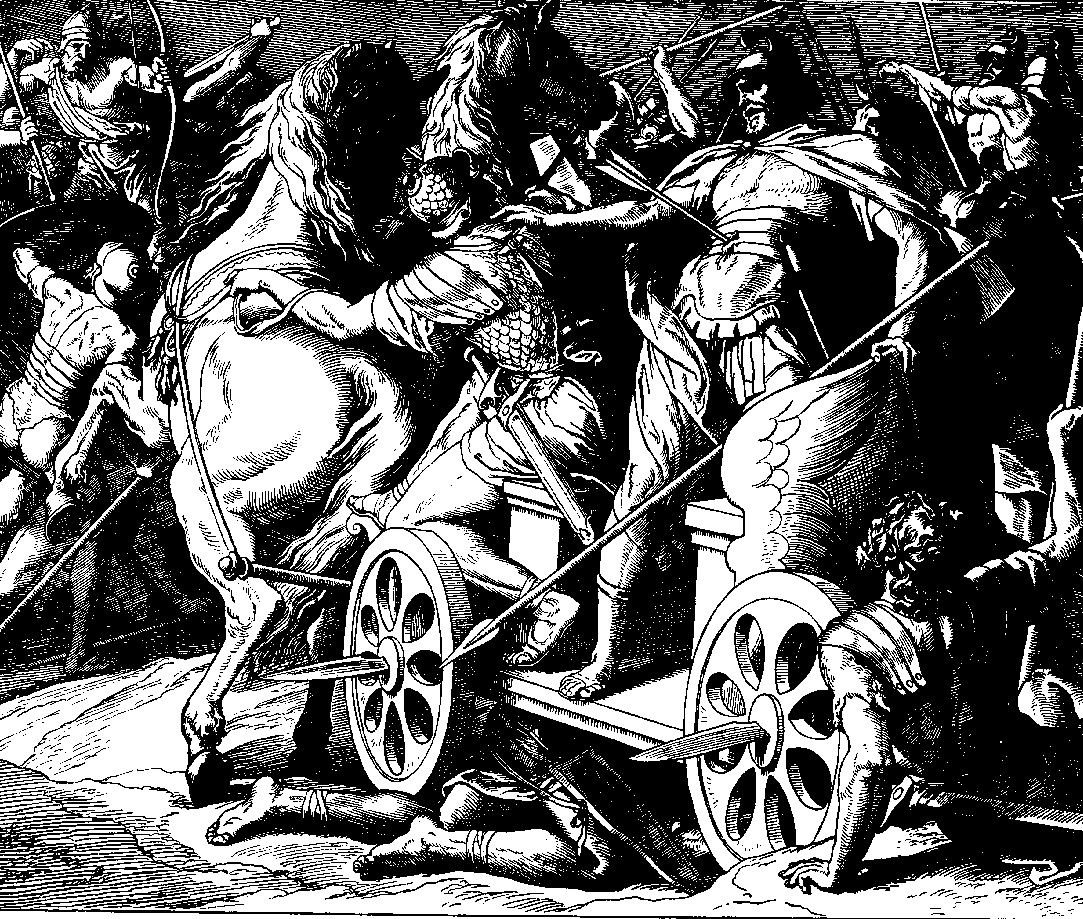|
Joram Of Israel
Jehoram ( ''Yəhōrām''; also Joram) was the ninth king of the northern Kingdom of Israel ( 2 Kings 8:16, 2 Kings 8:25–28). He was the son of Ahab and Jezebel, and brother to Ahaziah and Athaliah. According to 2 Kings, 2 Kings 8:16, in the fifth year of Jehoram of Israel, (another) Jehoram became king of Judah. The author of Kings speaks of both Jehoram of Israel and Jehoram of Judah in the same passage. Reign Jehoram began to reign in Israel in the 18th year of Jehoshaphat of Judah and ruled 12 years ( 2 Kings 3:1). William F. Albright dated his reign to 849–842 BCE, whereas E. R. Thiele proposed 852–841 BCE. Unlike his predecessors, Jehoram did not worship Ba'al, and he removed the pillar of Baal, probably a special pillar which Ahab had erected near his palace at Jezreel for his own and Jezebel's worship. However, the writer of 2 Kings says that he still "followed in the ways of Jeroboam, son of Nebat, who led the Israelites to sin". With Jehoshaphat of Judah, Jeh ... [...More Info...] [...Related Items...] OR: [Wikipedia] [Google] [Baidu] |
Guillaume Rouillé
Guillaume Rouillé ( la, Gulielmus Rovillium; 15181589), also called Roville or Rovillius, was one of the most prominent humanist bookseller-printers in 16th-century Lyon. He invented the pocket book format called the ''sextodecimo'', printed with sixteen leaves to the folio sheet, half the size of the octavo format, and published many works of history and poetry as well as medicine, in addition to his useful compilations and handbooks. Rouillé was born in Tours. Though he was a Frenchman, he served his apprenticeship in the Venetian printing-house of Gabriele Giolito de' Ferrari, and retained his connections with Venice as a source of texts after his arrival in Lyon around 1543. Among his works was the French translation by Barthélemy Aneau of Andrea Alciato's pioneering emblem book, which formed part of a major publishing venture in Lyons by the team of Guillaume Rouillé and his printer Macé Bonhomme, 1549, which extended to translations in Italian and Spanish. Rouillé al ... [...More Info...] [...Related Items...] OR: [Wikipedia] [Google] [Baidu] |
Jeroboam
Jeroboam I (; Hebrew: ''Yārŏḇə‘ām''; el, Ἱεροβοάμ, Hieroboám) was the first king of the northern Kingdom of Israel. The Hebrew Bible describes the reign of Jeroboam to have commenced following a revolt of the ten northern Israelite tribes against Rehoboam that put an end to the United Monarchy. Jeroboam reigned for 22 years. William F. Albright has dated his reign from 922 to 901 BC, while Edwin R. Thiele offers the dates 931 to 910 BC. Etymology The name ''Jeroboam'' is commonly held to have been derived from ''riyb'' and ''ʿam'' , signifying "the people contend" or "he pleads the people's cause". It is alternatively translated to mean "his people are many" or "he increases the people" (from ''rbb'', meaning "to increase"), or even "he that opposes the people". In the Septuagint he is called ''Hieroboam'' (Ἱεροβοάμ). Source of transliterations and explanation of significance. Biblical background Jeroboam was the son of Nebat, a member of t ... [...More Info...] [...Related Items...] OR: [Wikipedia] [Google] [Baidu] |
9th-century BC Kings Of Israel
The 9th century was a period from 801 ( DCCCI) through 900 ( CM) in accordance with the Julian calendar. The Carolingian Renaissance and the Viking raids occurred within this period. In the Middle East, the House of Wisdom was founded in Abbasid Baghdad, attracting many scholars to the city. The field of algebra was founded by the Muslim polymath al-Khwarizmi. The most famous Islamic Scholar Ahmad ibn Hanbal was tortured and imprisoned by Abbasid official Ahmad ibn Abi Du'ad during the reign of Abbasid caliph al-Mu'tasim and caliph al-Wathiq. In Southeast Asia, the height of the Mataram Kingdom happened in this century, while Burma would see the establishment of the major kingdom of Pagan. Tang China started the century with the effective rule under Emperor Xianzong and ended the century with the Huang Chao rebellions. While the Maya experienced widespread political collapse in the central Maya region, resulting in internecine warfare, the abandonment of cities, and a ... [...More Info...] [...Related Items...] OR: [Wikipedia] [Google] [Baidu] |
840s BC Deaths
84 may refer to: * 84 (number) * one of the years 84 BC, AD 84, 1984, AD 2084 * Eighty Four, Pennsylvania, an unincorporated census-designated place in Washington County, Pennsylvania, United States * Seksendört Seksendört (also known as Grup 84) is a Turkish pop rock band from Ankara. Seksendört consists of Tuna Velibaşoğlu, Arif Erdem Ocak, Serter Karadeniz, and Okan Özen. The band was formed in 1999 and started getting noticed under the name 'Sek ..., a Turkish pop group whose name means 84 See also * * List of highways numbered {{Numberdis ... [...More Info...] [...Related Items...] OR: [Wikipedia] [Google] [Baidu] |
Kingdom Of Judah
The Kingdom of Judah ( he, , ''Yəhūdā''; akk, 𒅀𒌑𒁕𒀀𒀀 ''Ya'údâ'' 'ia-ú-da-a-a'' arc, 𐤁𐤉𐤕𐤃𐤅𐤃 ''Bēyt Dāwīḏ'', " House of David") was an Israelite kingdom of the Southern Levant during the Iron Age. Centered in Judea, the kingdom's capital was Jerusalem. The other Israelite polity, the Kingdom of Israel, lay to the north. Jews are named after Judah and are primarily descended from it. The Hebrew Bible depicts the Kingdom of Judah as a successor to the United Kingdom of Israel, a term denoting the united monarchy under biblical kings Saul, David and Solomon and covering the territory of Judah and Israel. However, during the 1980s, some biblical scholars began to argue that the archaeological evidence for an extensive kingdom before the late-8th century BCE is too weak, and that the methodology used to obtain the evidence is flawed. In the 10th and early 9th centuries BCE, the territory of Judah appears to have been sparsely populated, ... [...More Info...] [...Related Items...] OR: [Wikipedia] [Google] [Baidu] |
Omrides
The Omrides, Omrids or House of Omri ( he, , translit=Bēt ʿOmrī; akk, 𒂍𒄷𒌝𒊑𒄿, translit=bīt-Ḫûmrî) were a ruling dynasty of the Kingdom of Israel (Samaria) founded by King Omri. According to the Bible, the Omride rulers of Israel were Omri, Ahab, Ahaziah and Jehoram. Ahab's daughter Athaliah also became queen regnant of the Kingdom of Judah. Five Assyrian records, some of which with known duplicates, are known to refer to either "Land of Omri" or "House of Omri". An archaeological reference to Omri and his unnamed son is found in the Mesha Stele, the only Northwest Semitic inscription known to reference this name. Biblical account The Bible generally portrays the Omrides unfavorably, stressing their apostasy from the religion of Yahweh in favor of Baal. It devotes little attention to Omri aside from noting his establishment of the dynasty and foundation of Israel's new capital of Samaria. In contrast, his son Ahab is the subject of an extended narrative fo ... [...More Info...] [...Related Items...] OR: [Wikipedia] [Google] [Baidu] |
Naboth
Naboth ( he, נבות) was a citizen of Jezreel. According to the Book of Kings in the Hebrew Bible, he was executed by Queen Jezebel so that her husband Ahab could possess his vineyard. Narrative 1 Kings 21:1-16 states that Naboth owned a vineyard, in proximity to King Ahab's palace in the city of Jezreel. Because of this, Ahab desired to acquire the vineyard so that he could use it for a vegetable (or herb) garden. Since he inherited the land from his ancestors, Naboth refused to sell it to Ahab. According to the Mosaic law, the law forbade the permanent selling of land. Frustrated at not being able to procure the vineyard, Ahab returned to his palace and went to bed without eating anything. His wife, Jezebel, after learning the reason for his being upset, asked mockingly, "Are you not the king?" She then said that she would obtain the vineyard for him. To do so, she sent a letter, under Ahab's name, to the elders and nobles of Naboth's city, instructing them to entrap Nabo ... [...More Info...] [...Related Items...] OR: [Wikipedia] [Google] [Baidu] |
Ramoth-gilead
Ramoth-Gilead ( he, רָמֹת גִּלְעָד, meaning "Heights of Gilead"), was a Levitical city and city of refuge east of the Jordan River in the Hebrew Bible, also called "Ramoth in Gilead" (; ; ) or "Ramoth Galaad" in the Douay–Rheims Bible. It was located in the tribal territorial allotment of the tribe of Gad. Biblical events According to (), Ramothgilead was the base of Ben-Geber, one of King Solomon's regional governors. He was responsible for ("to him belonged") the towns of Jair the son of Manasseh, in Gilead and the region of Argob in Bashan: sixty large cities with walls and bronze gate-bars. It appears to have been lost to Syria (Aram-Damascus) during the battles between the northern kingdom of Israel and Syria, as Ahab, King of Israel, proposed to go to battle to win it back. After consulting prophets about the prospects of success, Ahab went to fight for Ramoth in Gilead, aided by Jehoshaphat, King of Judah. During the battle, Ahab was wounded by an arrow. ... [...More Info...] [...Related Items...] OR: [Wikipedia] [Google] [Baidu] |
Ahaziah Of Judah
{{Short pages monitor ...
Ahaziah ( he, אֲחַזְיָהוּ, "held by Yah(-weh)"; Douay–Rheims: Ochozias) was the name of two kings mentioned in the Hebrew Bible: *Ahaziah of Israel *Ahaziah of Judah Ahaziah ( he, אֲחַזְיָהוּ, "held by Yah(-weh)"; Douay–Rheims: Ochozias) was the name of two kings mentioned in the Hebrew Bible The Hebrew Bible or Tanakh (; [...More Info...] [...Related Items...] OR: [Wikipedia] [Google] [Baidu] |
Hazael
Hazael (; he, חֲזָאֵל, translit=Ḥazaʾēl, or , romanized as: ; oar, 𐡇𐡆𐡀𐡋, translit= , from the triliteral Semitic root ''h-z-y'', "to see"; his full name meaning, " El/God has seen"; akk, 𒄩𒍝𒀪𒀭, Ḫa-za-’- ilu) was an Aramean king who is mentioned in the Bible. Under his reign, Aram-Damascus became an empire that ruled over large parts of Syria and Israel. While he was likely born in the greater Damascus region of today, his exact place of birth is still controversial, with both Bashan and the Beqaa Valley being favoured by different historians. In the Bible Hazael is first mentioned by name in . God tells Elijah the prophet of God to anoint Hazael king over Syria. Years after this, the Syrian king Ben-Hadad II, probably identical to Hadadezer mentioned in the Tel Dan Stele, was ill and sent his court official Hazael with gifts to Elijah's successor, Elisha. Elisha told Hazael to tell Hadadezer that he would recover, and he revealed to Haza ... [...More Info...] [...Related Items...] OR: [Wikipedia] [Google] [Baidu] |
Cannibalism
Cannibalism is the act of consuming another individual of the same species as food. Cannibalism is a common ecological interaction in the animal kingdom and has been recorded in more than 1,500 species. Human cannibalism is well documented, both in ancient and in recent times. The rate of cannibalism increases in nutritionally poor environments as individuals turn to members of their own species as an additional food source.Elgar, M.A. & Crespi, B.J. (1992) ''Cannibalism: ecology and evolution among diverse taxa'', Oxford University Press, Oxford ngland New York. Cannibalism regulates population numbers, whereby resources such as food, shelter and territory become more readily available with the decrease of potential competition. Although it may benefit the individual, it has been shown that the presence of cannibalism decreases the expected survival rate of the whole population and increases the risk of consuming a relative. Other negative effects may include the increased r ... [...More Info...] [...Related Items...] OR: [Wikipedia] [Google] [Baidu] |






